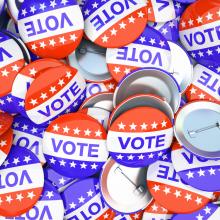primaries
THE SOUTHERN BAPTIST CONVENTION has long been a bellwether for conservative politics. At its annual gathering, controversial resolutions often forecast the upcoming battles of our nation’s culture wars. For too many in the denomination, soul competency has given way to partisan loyalty. This transformation began in 1979 when Paul Pressler and Paige Patterson launched an unprecedented, highly orchestrated campaign to persuade members to vote for a fundamentalist SBC president, who then began a cascade of fundamentalist appointments at every level of the denomination. Being “moderate” on abortion, gender roles, and gay rights, among other issues, became deal breakers. Those who found themselves on the outs with fundamentalist extremists were, as they have described, exiled.
Gendered hierarchies are fertile ground for sexual abuse, and in 2018 Patterson was fired as president of Southwestern Baptist Theological Seminary for mishandling sexual assault investigations. The toppling of this fundamentalist leader reverberated through the SBC, and a growing chorus of voices, most notably former member Beth Moore, called on the denomination to address this issue as well as restrictions placed on women in ministry. And the politicization of critical race theory, which David Theo Goldberg of the Boston Review called the “weaponization of colorblindness,” also perched high on the SBC agenda. Both issues figured prominently in the choice of a new SBC president this spring.
Candidate Ed Litton of Alabama conceded that there should be conversations about structural racism and investigations into the denomination’s handling of sexual abuse, while Mike Stone of Georgia doubled down on the fundamentalist position championed for years by Patterson and his acolytes. Thus, the 2021 election of the SBC president was seen as a referendum not only on these issues, but also on the Trumpian politics of political extremism and absolutism that underscore them. Stone took an early lead in the voting, which signaled to many observers that the bond between the SBC and Trump’s Republican Party would prove unbreakable. Moderates breathed a sigh of relief when Litton emerged as the winner; headlines noted that the SBC had pushed back against the denomination’s version of Trump extremism.

Image via Koksharov Dmitry/Shutterstock.com
North Carolina's voter ID law, which requires would-be voters to display an acceptable form of government-issued voter ID in order to cast a ballot, went into effect for the first time in last night's primary. Early voting behaviors offered a first look at some of the problems that come with these voting restrictions, reports ThinkProgress. Namely, how young people are being blocked from voting.
Thousands cast their ballots in yesterday’s primary election and the results?
Things pretty much stayed the same.
Romney is still the front runner, Santorum the closest challenger, Paul continues his campaign to influence the GOP agenda and Gingrich is still Gingrich.
With the end of the primaries nowhere in sight, Democrats are smiling in remembrance to their own long drawn out fight between the Obama and Clinton campaigns during the 2008 cycles. While the preponderance of advertising and horse race coverage can be tiring, are these drawn out battles a good thing?
Today is Super Tuesday, the action-packed day for GOP presidential hopefuls as 10 states undergo primary elections. To bring us further into the spirit of Super Tuesday the blog team at Sojourners has compiled 10 songs for a “Super Tuesday Mixtape.” (In addition to our favorite scene from Little Miss Sunshine: Abigail Breslin shaking it to "Superfreak.")
With the Iowa caucus, the "First in the Nation" New Hampshire primary, and South Carolina's primary now behind us, the field of contenders for the Republican nomination continues to shrink. I've watched with great interest as the spectacle rolls on and a parade of non-Romney's (Non-Roms, going forward) rhythmically rise and fall. What is perhaps most interesting about the current frontrunners is the lack of an obvious evangelical candidate. For all the talk that we hear about the importance of the evangelical vote, one would suspect at least one of the potential nominees to be, you know, an evangelical.
But Michele Bachmann is out of the race after a promising start in the Iowa straw poll. Perry, whose entrance into the race as a more "electable" evangelical candidate may have contributed to Bachmann's quick downfall, all but eliminated himself in a number of now infamous debate flops. That leaves one not particularly religious Baptist, two Roman Catholics, and a Mormon. Rick Santorum, a Catholic, is perhaps the most socially conservative and thus the most evangelical-looking of the Non-Roms, but many evangelicals have a deep mistrust of Catholics, so it is doubtful that, as they did in Iowa, evangelicals will support him despite his Catholicism.
So what happened here? Back in 2004, when talking about the evangelical vote was all the rage, one could presume that evangelicals were a unified political front—that denominations or non-denominations within evangelicalism didn't matter, theological differences were moot, and ending abortion was enough to tie them all together. The problem with this presumption is that it was never true. There was never one kind of evangelical. If there was, self-identified evangelicals wouldn't have to add a definition or disclaimer every time they identify as such.
If the GOP primaries were like Old Country Buffet, I’d be happy.
Think about it. There wouldn’t be so much money involved and we could pick only the stuff we liked and ignore the rest.
And of course, everyone knows the basic rules of smorgasbord grazing, such as you can’t get decent sushi in the Midwest or proper social conservatives from Massachusetts.



